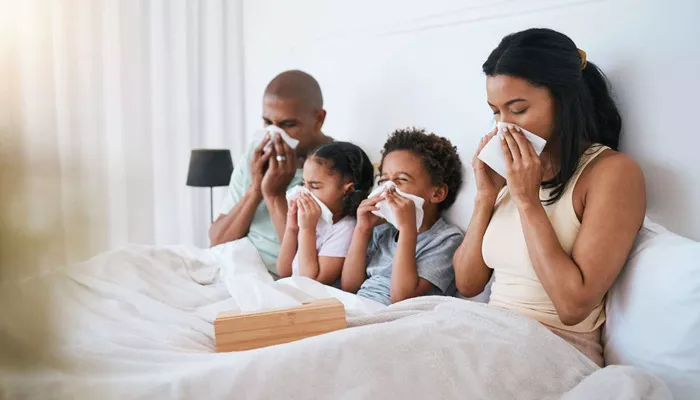The common cold is a viral infection that affects millions of people every year. It is caused by various viruses, with rhinoviruses being the most common. Understanding when you are contagious during a cold is important for preventing the spread of the virus to others. This article will explain the stages of a cold, how long you are contagious, and what you can do to protect yourself and those around you.
What is a Cold?
A cold is an upper respiratory tract infection. It usually causes symptoms like a runny nose, sore throat, cough, and sneezing. Colds are generally mild and self-limiting, meaning they resolve on their own without serious complications. However, they can be uncomfortable and inconvenient.
Common Symptoms of a Cold:
- Runny or stuffy nose
- Sore throat
- Cough
- Sneezing
- Mild headache
- Fatigue
- Low-grade fever (in some cases)
How Do Colds Spread?
Colds spread easily from person to person. The virus can be transmitted in several ways:
Airborne Droplets: When an infected person coughs or sneezes, tiny droplets containing the virus are released into the air. If someone else breathes in these droplets, they can become infected.
Direct Contact: Touching an infected person or surfaces they have touched can also spread the virus. If you touch your face after coming into contact with the virus, you can introduce it to your mucous membranes.
Contaminated Surfaces: The cold virus can survive on surfaces for several hours. Common surfaces include doorknobs, light switches, and shared electronics.
Understanding how colds spread helps emphasize the importance of hygiene and preventive measures.
Stages of a Cold
A cold typically progresses through several stages:
Stage 1: Incubation Period
The incubation period is the time between exposure to the virus and the appearance of symptoms. For colds, this period usually lasts between 12 hours to three days. During this time, you may not feel sick but can still spread the virus to others.
Stage 2: Onset of Symptoms
Symptoms usually begin with a scratchy or sore throat, followed by nasal congestion and sneezing. This stage typically lasts for one to three days. You are contagious during this time.
Stage 3: Peak Symptoms
Symptoms often worsen during this stage, which usually occurs two to three days after symptoms start. You may experience more severe symptoms such as coughing and fatigue. This is when you are most contagious.
Stage 4: Recovery
As your body fights off the virus, symptoms start to improve. This stage can last from a few days to over a week. You may still be contagious for some time after your symptoms begin to fade.
When Are You Contagious?
You can be contagious at different points during a cold:
Before Symptoms Appear: You are often contagious one to two days before you start feeling sick. This means you can spread the virus without even knowing it.
During Peak Symptoms: You are most contagious during the first three days after your symptoms appear when they are at their worst.
After Symptoms Begin to Improve: You may still be contagious for up to two weeks after your cold starts, especially if you have lingering symptoms like a cough.
Contagion Timeline:
1-2 Days Before Symptoms: Contagious
Days 1-3 (Peak Symptoms): Most contagious
Days 4-7 (Recovery): Still contagious but decreasing risk
Up to 2 Weeks: Possible contagion if symptoms persist
How Long Does a Cold Last?
Most colds last about seven to ten days. However, some symptoms like coughing may linger for weeks after other symptoms have resolved. The duration of illness can vary based on individual health and immune response.
Preventing the Spread of Colds
To reduce the risk of spreading or contracting a cold, consider these preventive measures:
1. Wash Your Hands Frequently
Regular handwashing with soap and water is one of the most effective ways to prevent illness. If soap and water are not available, use hand sanitizer containing at least 60% alcohol.
2. Avoid Close Contact
Try to keep your distance from people who are sick. If you are sick yourself, stay home until you feel better to avoid infecting others.
3. Cover Your Mouth and Nose
When coughing or sneezing, cover your mouth and nose with a tissue or your elbow rather than your hands. This helps prevent droplets from spreading into the air.
4. Disinfect Common Surfaces
Regularly clean surfaces that are frequently touched, such as doorknobs, light switches, and phones.
5. Stay Hydrated and Rested
Taking care of your health by staying hydrated and getting enough rest can help your immune system fight off infections more effectively.
When Should You See a Doctor?
Most colds resolve on their own without medical intervention. However, there are times when you should seek medical advice:
- If your symptoms worsen or do not improve after ten days.
- If you develop a high fever (over 101°F or 38°C).
- If you experience difficulty breathing or chest pain.
- If you have underlying health conditions that could complicate recovery.
Conclusion
Understanding when you are contagious during a cold is essential for preventing its spread to others. You can be contagious even before showing symptoms and remain so for up to two weeks after becoming ill. Practicing good hygiene and taking preventive measures can help protect yourself and those around you from catching a cold.
By being aware of the stages of a cold and how it spreads, individuals can take steps to minimize risks during cold season while also supporting their recovery process effectively. Remember that while colds are common and usually mild, being proactive about health helps create a safer environment for everyone involved.
Related topics:


